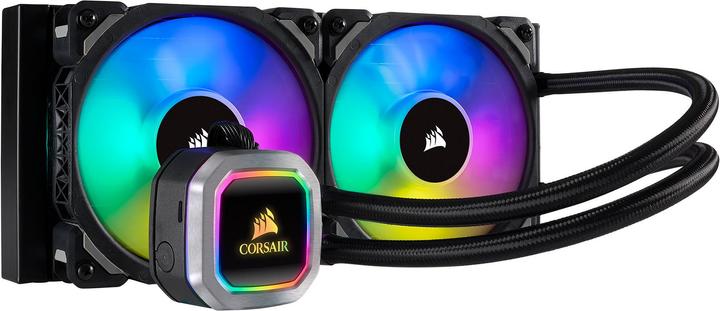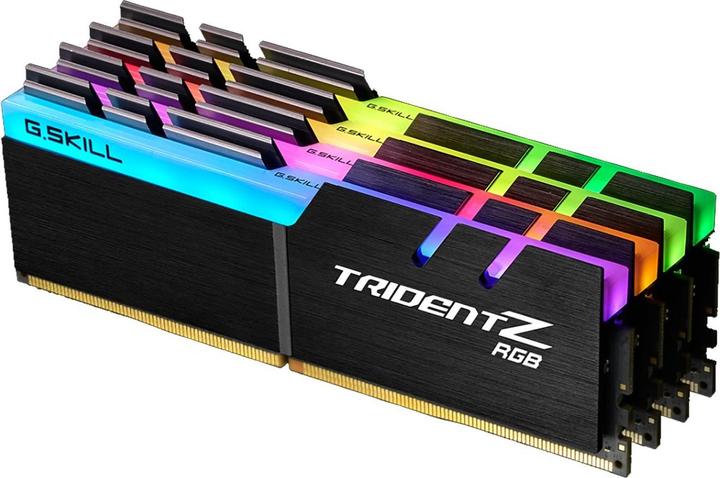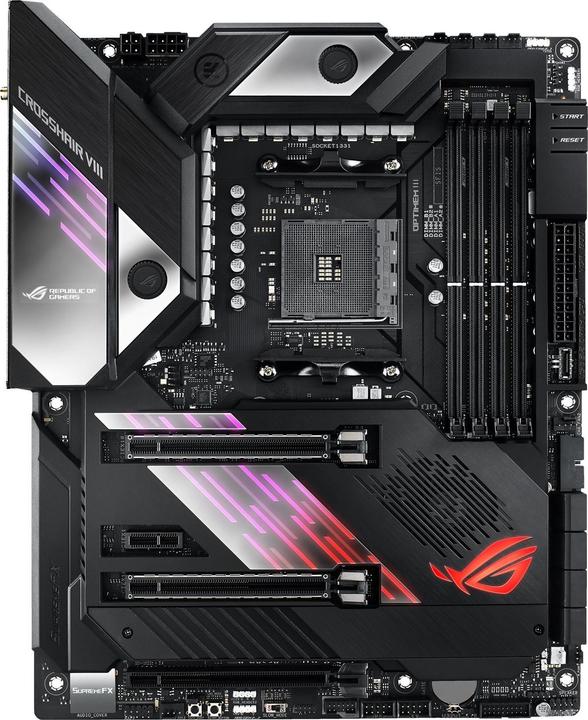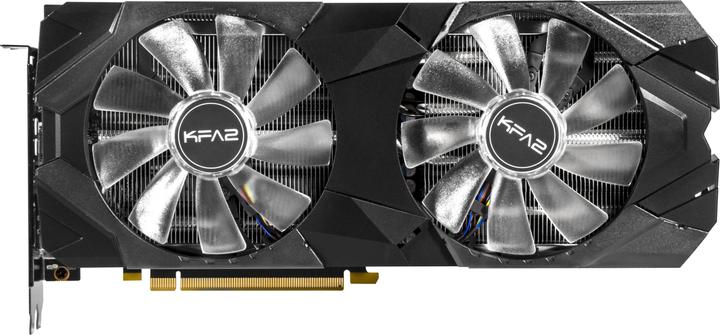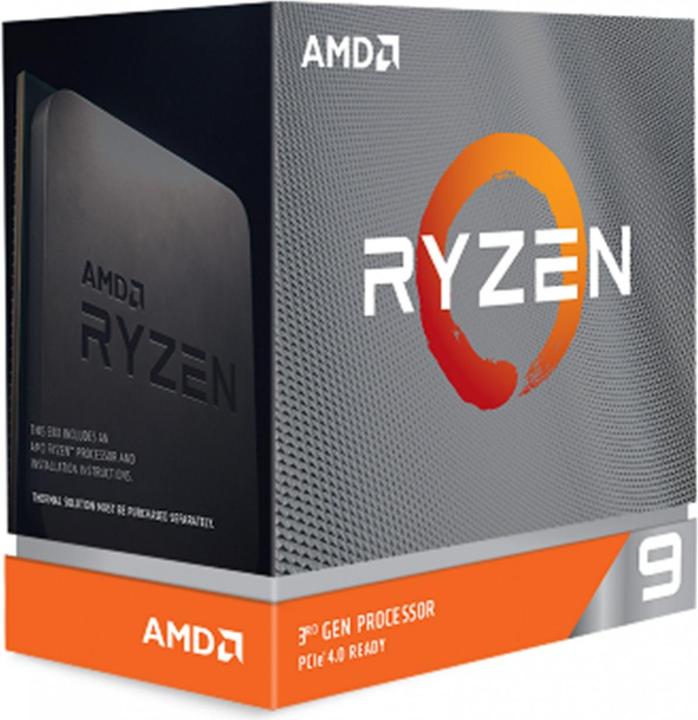

Now the results are even worse: night tests of the AMD Ryzen 3950X
Some of you didn't trust my results in the review of the Ryzen 3950X. Other reviewers would have achieved better results, especially in Cinebench R20. Based on your feedback, I updated our system to the very latest version and carried out night tests - and got even worse results.
With so many questions, I couldn't avoid putting the Ryzen 9 3950X back on the testbench and testing it again. Unfortunately, the whole thing took a little longer because the Threadripper 3970X got in the way.
Why are your results so different from those of Computerbase, for example?
Somehow the results don't make sense, there seem to be a lot of transposed numbers, please check again!
It seems to me that other reviews had measured bigger performance jumps between 3900X and 3950X in the multicore area (~5% more). Was there perhaps something wrong with the OS or drivers? The reason for the surprise are the results from Computerbase and Golem. (Cinebench, Handbrake)

What's new?
After the review, the first thing I did was get myself an AIO water cooling system from Corsair. In my follow-up test, I also want to find out how well or poorly the stock cooler from AMD performs.
In contrast to the original review, this time I'm also focussing on different RAM:
I also used this for the review of the Threadripper 3970X and put it on the Formula mainboard. This means I have more reliable data for comparisons at a later date.
Warming up with Cinebench R20
As with the original review, I have AGESA 1.0.0.4 installed, as recommended by AMD. I have also updated the drivers for the mainboard and the graphics card (version GeForce Game Ready Driver 441.20).
I start with Cinebench R20. I do five runs in succession and note the best result. Here are the results of the single core and multi core benchmarks.
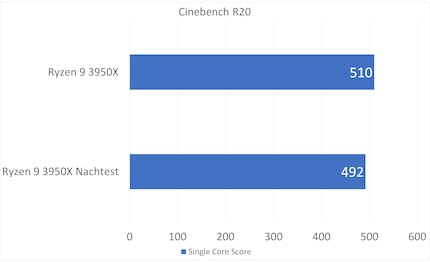
The 3950X scored even worse in the single core in the post-test and only four points higher in the multi core. Have I changed something in the BIOS in the meantime? I reset it to the default settings as a precaution. I don't get a better result this way either. Perhaps driver and minor Windows updates are having a negative effect on performance?
Time Spy and Fire Strike: the night tests are also slower here
I'll try Time Spy and Fire Strike right away. Here are the results for now
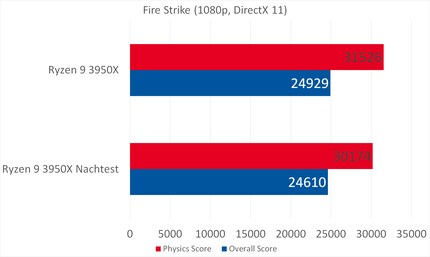
In the post-test, the 3950X performs between three and three and a half per cent worse in the CPU tests. That's not much, but still disappointing.
In the Fire Stirke, I briefly recorded temperatures of just under 63° Celsius. The average temperature is 55° Celsius. In the Time Spy, the maximum was just under 72° Celsius at times. The average temperature in the CPU tested in Time Spy Extreme is 65° Celsius. This shows that the AIO is much more efficient than the stock cooler. With the latter, I had between 70° and 77° Celsius in Fire Strike and 75° Celsius in Time Spy Extreme. The poorer benchmark results in the post-test can therefore not be explained by the cooling.
Overclocking light
The fact that I've had consistently poorer results so far bothers me. I decide to overclock for the poor, i.e. I activate the highest OC preset from Asus in the BIOS. I set the "Performance Enhancer", with which the boost clock can be maintained for longer, to the maximum, I activate the "Core Performance Boost", which automatically overclocks the CPU and DRAM, and I also activate the "Precision Boost Overdrive". I leave the other settings as they are.
I'll try again with Cinebench. After all: With these settings, I achieve a total of 503 points in Single Core and over 9000 points in Multi Core.
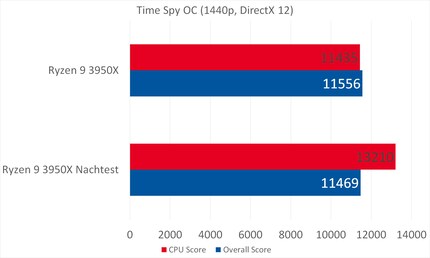
I still find it amazing that I have to enable the automatic overclocking settings. Other reviewers have achieved better results with the default settings.
How does the overclock affect the temperatures? I start Time Spy. The result shows a maximum of 82° Celsius. In the CPU test, the average is 72° Celsius. So the CPU runs a lot hotter, but the temperatures are still within limits. If you want to overclock more, we recommend a larger AIO or a custom water cooling system.
Application benchmarks: With and without overclocking
I'll list the results of the application benchmarks without comment. You can find out exactly what the benchmarks do in the original review or the test methodology.
What stands out: Only by overclocking do I achieve better results than in the review - and that despite 64 instead of 16 GB of RAM. The amount of RAM therefore plays a subordinate role in the tests carried out. The memory timings of the G.Skill RAM differ from those of the Corsair RAMs that I used in the original test. Even with overclocking, I can't get close to the After Effects values and the programme is very RAM-intensive. The memory timings seem to play a bigger role in the application than the amount of RAM.
The RAM may also have an effect on my result in Cinebench. I swap the G.Skill RAM with the Corsair RAM for a short Cinebench R20 test run. I don't get a better result in either Multi Core or Single Core. So with Cinebench, it's not down to the RAM.
Puget Systems Photoshop benchmark
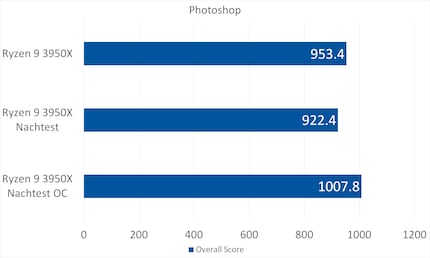
Puget Systems Premiere Benchmark
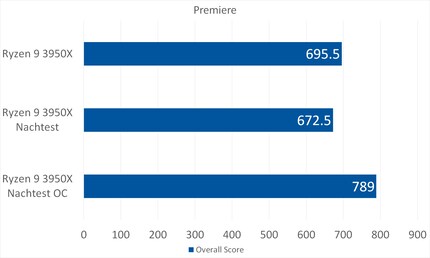
Puget Systems After Effects Benchmark
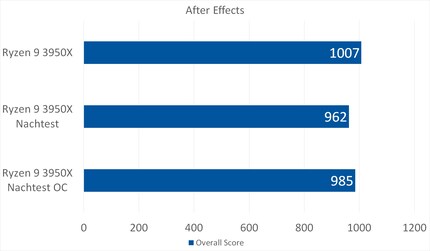
Puget Systems Resolve Benchmark
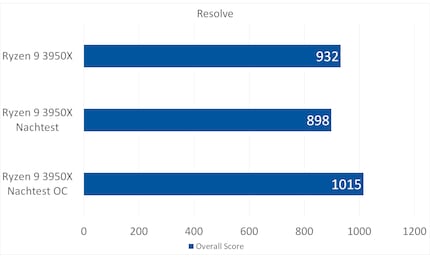
Handbrake
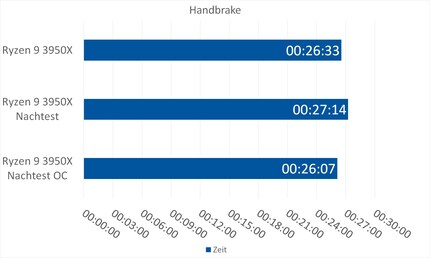
Blender
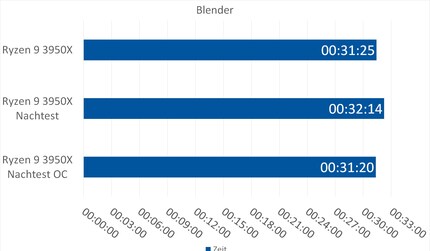
The games
I am still systematising the games. Instead of always playing the same scenes, I run in-game benchmarks where possible. This makes the results easier to compare. With "Control", I pay even more attention to playing exactly the same scene in more or less the same time. In the future, I may also do without "Control" and use Crytek's Neon Noir benchmark for ray tracing. I'll then record another game - or even several: it's quick with in-game benchmarks.
Why I'm talking so much about the methodology here: The results are not comparable at all because I played certain scenes in each game beforehand and recorded the FPS. It's probably mainly because I have worse FPS values in the night tests than originally.
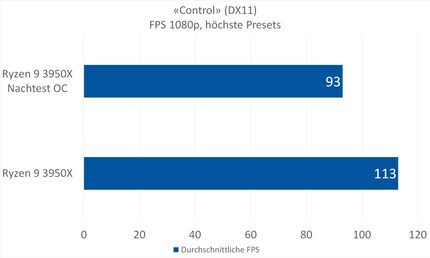
Average frame time: 11 ms
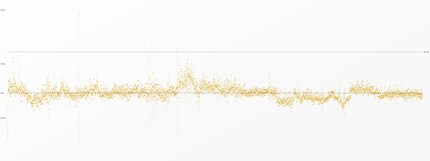
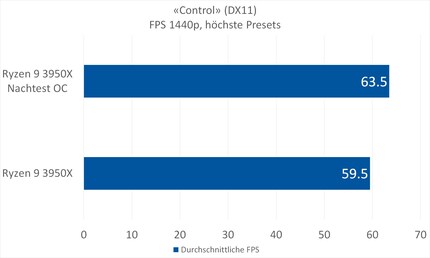
Average frame time: 15.8 ms
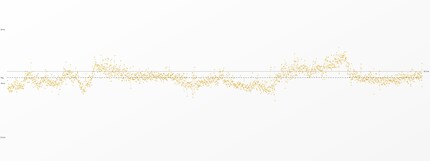
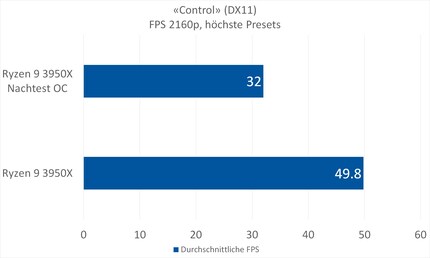
Average frame time: 18.7 ms
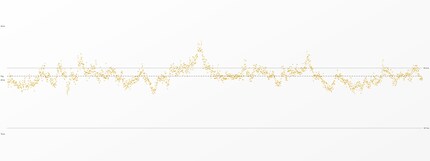
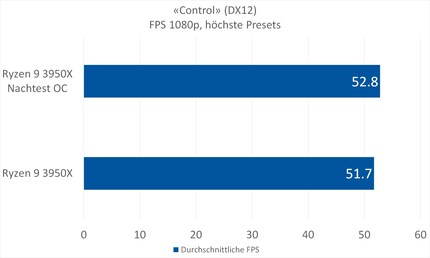
Average frame time: 28.5 ms
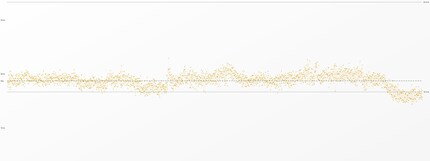
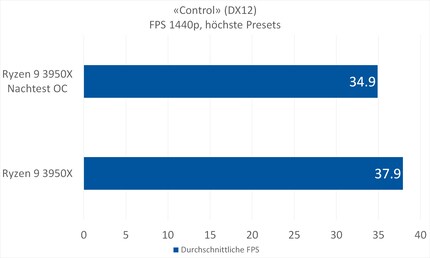
Average frame time: 31.1 ms
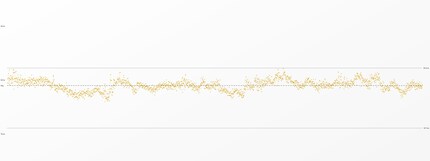
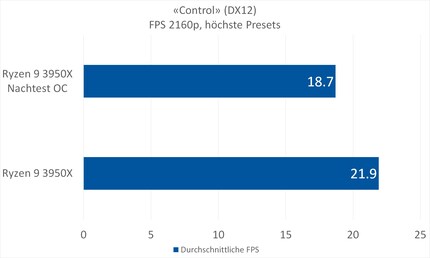
Average frame time: 53.6 ms
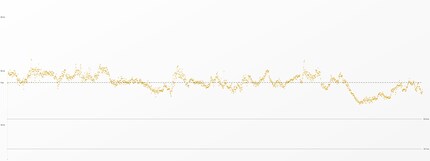
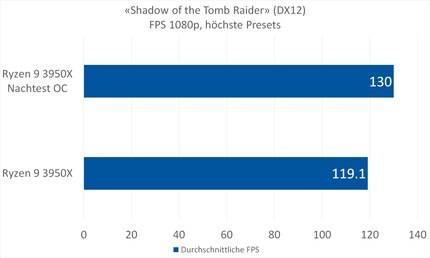
Average frame time: 7.57 ms
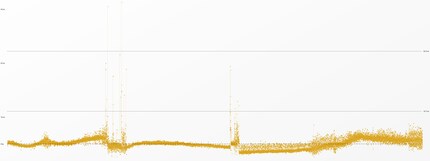
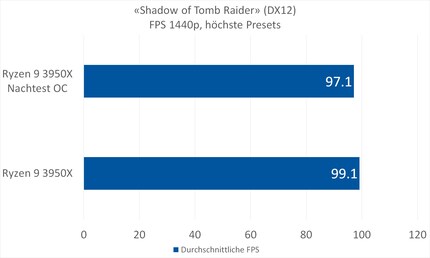
Average frame time: 10.2 ms
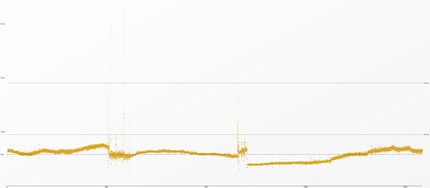
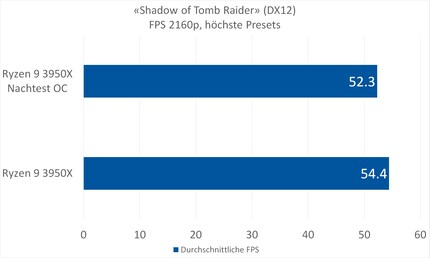
Average frame time: 19.1 ms
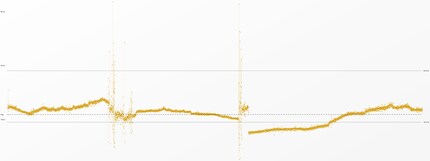
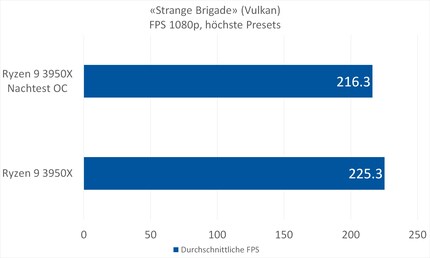
Average frame time: 4,622 ms
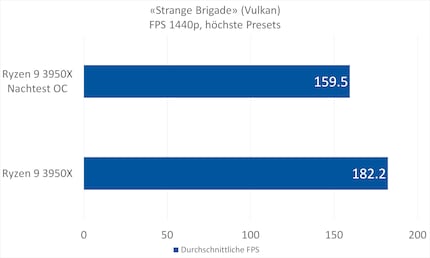
Average frame time: 6,269 ms
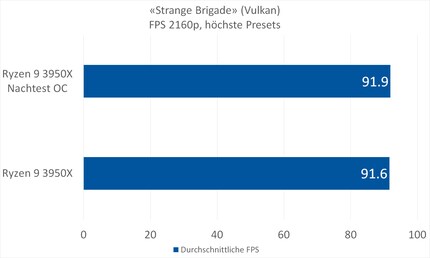
Average frame time: 10,887 ms
Conclusion: Is the Silicon Lottery to blame?
Okay, I admit it: using the stock cooler from AMD is not ideal. Nevertheless, its cooling performance is sufficient in stock mode. If you want to get more out of the Ryzen 9 3950X, you'll definitely need a more powerful cooler. The AIO from Corsair did its job when tested, but personally I would at least opt for one with a 360 radiator - or preferably custom water cooling.
Although all drivers are up-to-date, the temperatures are OK and everything is set correctly, I have lower values than other reviewers with my Ryzen 9 3950X and in the post-test in stock mode even lower than originally. The only factor I can still see is the mainboard. Or that I was simply unlucky in the silicon lottery and got a lame chip. I'm still planning to install the processor on a B450 mainboard anyway to see how it performs there. I'll keep you up to date.
From big data to big brother, Cyborgs to Sci-Fi. All aspects of technology and society fascinate me.
